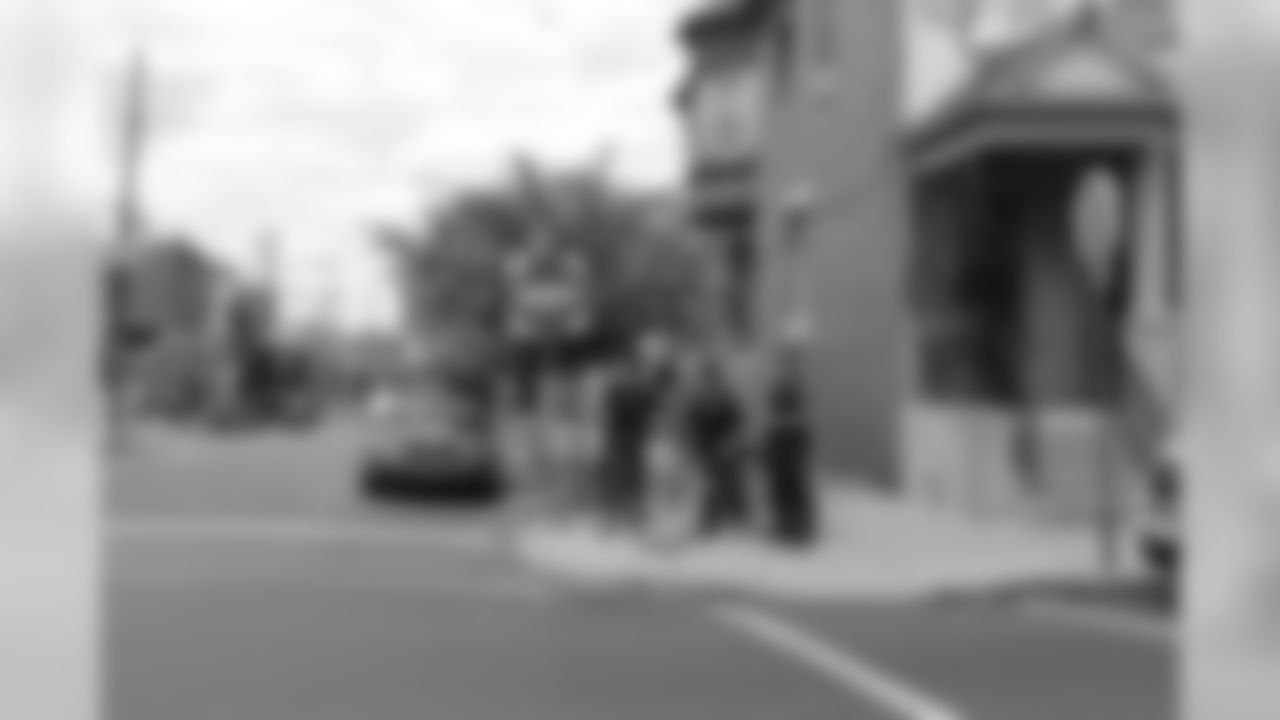The final practice of minicamp around the NFL is like the last day of school. Afterwards, players hightail it out of the parking lot, jetting off to their home or favorite vacation spot for some much-needed rest and relaxation following a nine-week offseason workout program.
Three Giants stayed behind this year.
Less than 24 hours after wrapping up spring football, Olivier Vernon, Damon Harrison and Patrick Omameh spent an enlightening day in mid-June with the Camden County Police Department, located in southern New Jersey just across the river from Philadelphia. They were connected through the Vera Institute of Justice, a nonprofit organization that works closely with the government to build and improve justice systems that ensure fairness, promote safety, and strengthen communities. Vera views the Camden County police department as "really a model for the rest of the country, if not the world" in its community policing and de-escalation efforts.
Vernon, Harrison and Omameh got a first-hand look at this philosophy in action. They walked the beat, toured the state-of-the-art headquarters with Chief John Scott Thomson, heard from the local youth, visited a family service organization, and experienced the 360 Use of Force Simulator that is used to train officers.
"I speak to a lot of communities and kids, and when I do that, they're asking me what are the officers doing, the police forces, what are they doing to try to change some of the things that we're seeing or that they promised to change," Harrison said. "So if I don't come here and don't sit down with these guys and understand exactly the programs that they're implementing, then how can I go into the communities and tell them to have faith that things are getting changed? So just to sit down with them and get a thorough understanding of what they're doing, I can convey their message back."
And that message is one of partnership instead of enforcement.
"Back in the 90s, we led the nation in crime," Assistant Chief Joseph Wysocki said. "We were the most violent [city] with Gary, Indiana, year after year. The violent crime was at a rate that was unheard of in America. It wouldn't be uncommon for you to be driving down the street and have the window down and hear gunshots throughout the night. Back then, we tried to have a community policing unit. It was a squad. It was like 10 guys, but you can't communally police a city with nine square miles with just 10 guys. It's just not realistic. We have to change the culture. It has to be everybody. So what we did is we changed the way we did things. We started policing Camden a different way. We knocked on doors and introduced ourselves. Where we are now, with partnering with the community and listening to the community, we're at a 50-year low in crime."
Olivier Vernon, Damon Harrison and Patrick Omameh spent a day with the Camden County Police Department



















Under Chief Thomson, Camden is seeing its lowest homicide total since 1985 and the lowest total crime numbers since 1968, according to the department.
"That's amazing what you're saying about changing the culture because we know how important that is with moving forward and the next generation of young cops will be learning from you guys," Harrison said during a Q&A with a group of officers. "So it won't be the old ways as it was before. It'll be exactly the way that you guys are teaching them and passing that along. I know it won't happen overnight, but over time my hope is that the entire country would adapt to the way that you guys are doing it."
Thomson, who was sworn in on May 1, 2013, came in at a time when the city department was disbanded and replaced by the county department. All officers had to reapply, and Chief Thompson's new philosophies were installed.
One of the ways Camden County PD implements his vision is through the 360 Use of Force Simulator, a total virtual reality experience designed to immerse a trainee in a real-life situation. In an octagon with screens on all sides, the trainee steps up and is presented with the sights and sounds of a scenario not uncommon to the ones police officers respond to on a daily basis. Through a controller off-screen, the training officer plays off what the trainee does and says, dictating where the video goes next. The goal is for trainees to hone crisis intervention and de-escalation techniques.
The Giants players all took a turn, with officers coaching them on creating distance when necessary and using communication rather than force to control the various scenarios.
"When it comes to approaching the situation with a mind for trying to not heighten the situation," Omameh said, "I think it's an incredible way to actually approach these things and the way that the Camden County Police Department is trying to really change the mold in how things are done traditionally, I think it's incredible. It's a huge testament to their efforts."
Omameh added: "I think that's the community policing that they're trying to do where you build the relationships with the people in the community, and when there is something that the people in the community want to call in about, they don't feel like they're calling the police department; they're calling Officer Zach, who I know, who is a person, who is a friend. And then also when the officers respond to situations, they're not just going to a situation and it's not just, 'Here's the situation, here are the variables, here's the scenario.' It's, 'Oh, this is Jake and Emily, who I know. I know their nature. I know their relationship, and I might know better how to approach them in order to de-escalate the situation or address the situation or understand the situation because it might not be what it appears. I know them personally. I know what might be going on. I think it's incredible."
For Vernon, the simulator struck a personal chord. His father, Lascelles, was a police officer for 25 years in Miami.
"As a kid, I didn't really realize the position of where he was at and he could have stepped out the door and not come back," Vernon said. "As a kid, you don't really think about that until you start getting older and you start realizing that every day walking out the door could be his last. So that's one of the things that you learn to appreciate, and my dad was on the streets for years, probably 25 years, and I'm most appreciative towards him for the things he's done. Now being able to see what other police officers do in a different region, coming up here, coming up north, and seeing the type of passion they have, it reminds me of my dad's passion of what he did. He loved being a cop. He loved being around people, communicating with people. Seeing this whole precinct, the Camden Police Department, and seeing what they're doing, it's amazing."

After lunch with the department, which the players provided as a thank you to the officers for their work in the community and their willingness to host them for a day, Chief Thomson led a tour of the Real Time Tactical Operation Intelligence Center (RT-TOIC). Then the three Giants, dozens of officers and a handful of young people from the community sat around a long conference table for an open dialogue.
"This is a larger part of trying to build relationships," Thomson said. "To have these three gentlemen [Vernon, Harrison and Omameh] spend their off-day with us is something we're deeply indebted to them – they have our deep gratitude. One of the things that we realized when we really started to listen to the community, and a lot of the things that we talked about with our community policing and the like, we realized that even with a lot of the strides that we were making, particularly with the adult community, there was a major disconnect between us and the youth within our community."
It was neither the first nor last time this dialogue has happened between the Camden County PD and the local youth. They are partnering with the NYU School of Law's Policing Project and students from Woodrow Wilson High School in an effort to bridge the gap.
"We wanted [the Giants players] to get to know the police officers and what is so important and so special about the Camden County Police Department and what is really a model for the rest of the country, if not the world," said Rebecca Neusteter, policing program director at the Vera Institute of Justice. "We know that [they] could be home right now or on a jet on the way home, sleeping in, not sitting on a bus … so we appreciate the time they took to be here. It's really inspirational to us that despite all the pressures that [they] have throughout the season, you're willing to stay an extra day away from your family, away from your recovery and recuperation, to learn about stuff that's hard. We're all here because we care about these issues, but it's not easy. People's lives are on the line."

After the talk, it was time to hit the streets.
The Giants walked one of the department's beats, an area once known as "Heroin Highway" in North Camden. Now it is safe to walk again. Instead of counting how many tickets are issued, Chief Thomson measures success by how many kids are riding bikes in that officer's section of Camden.
Along the beat, the Giants also visited Guadalupe Family Services, which the FBI office in Philadelphia selected this year for its Director's Community Leadership Award, one of 56 around the country. Guadalupe Family Services is a social service agency committed to maintaining, strengthening and reconciling the relationships that form the foundation of the community.
"This community has changed so much in the past couple years because of the policing efforts," said Sister Helen Cole, the director and founder. "The cops make themselves so accessible to us. It changed the whole neighborhood. It changed people's perception from the hostility that was here when I first came in the 90s. I think that the engagement, the approach that the police have taken, has really paid off in the last two and a half, three years."
For citizens who don't live in Camden, though, it's one thing to talk about the work that is being done. It's another thing to witness it. But the real opportunity comes in how they use what they saw and witnessed in moving forward. That is how Camden became a model for police departments around the country to use as a case study.
"It's amazing seeing the dialogue that the law enforcement has with the people that live amongst this neighborhood," Vernon said, "and how everybody is just basically working together and how it changed from what I heard a few years ago, how Camden used to be to what it is now. It's like night and day from what I've been told. That's amazing what just little things like that can have a ripple effect and make a big difference amongst everything that's going on. And you can change from one of the most dangerous neighborhoods to now you can walk down the street. You have people out, you have kids playing basketball and football out here, and it's very eye-opening."
"The one thing that I would take away is the communication and the community policing," Harrison said. "I've heard about it, I've read about it, but to actually come here and see that you have officers actually walking up and down the street talking to the people that are sitting outside on their porches, they're involved in their communities and it seems to me that at least in this community they trust the officers. So I think that's a step in the right direction."
"I think the number one takeaway is relationships, in general, are huge as far as trying to create a common understanding," Omameh said. "If both sides understand each other on a personal level, that's when you can really have a common ground. I think it makes all the difference, and the Camden PD is really the living testament to that."








